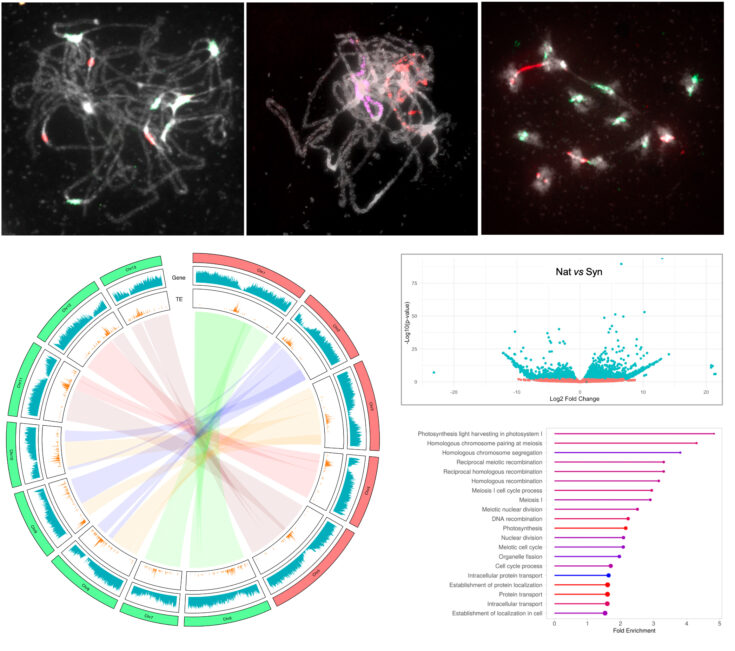The goal of the MeioPoly project is to elucidate the evolutionary processes of meiotic stabilization of nascent allopolyploids, with a special emphasis on understanding the molecular mechanisms that prevent recombination between related chromosomes.
Hybridization between related species resulting in allopolyploidy is ubiquitous in the evolutionary history of plants. Such nascent allopolyploids face the challenge of ensuring accurate chromosome segregation during meiosis in the presence of related, but non-identical chromosome sets (called homoeologues), inherited from the allopolyploid’s progenitors. Essential for fertility, this relies upon the formation of physical connections (crossovers) between homologous chromosomes, while crossovers between homoeologues - that could lead to aneuploidy - must be prevented. Meiotic stability in the allopolyploid context thus requires a tight control of recombination partner choice. The existence of highly fertile natural allopolyploids shows that solutions exist and have arisen many times during evolution, but the mechanisms involved remain poorly understood.
We propose to recreate in the lab the natural hybridization that happened ~16 Kya between Arabidopsis thaliana and Arabidopsis arenosa leading to Arabidopsis suecica in order to characterize the mechanisms underlying the evolution of the young allopolyploids over the first generations as they acquire meiotic stability and full fertility.
MeioPoly has three main objectives:
(1) Map and characterize genome-wide recombination between homoeologues
(2) Identify the factors that control homoeologous pairing and recombination
(3) Elucidate how this control is progressively set up following allopolyploidization
Hybridization between related species resulting in allopolyploidy is ubiquitous in the evolutionary history of plants. Such nascent allopolyploids face the challenge of ensuring accurate chromosome segregation during meiosis in the presence of related, but non-identical chromosome sets (called homoeologues), inherited from the allopolyploid’s progenitors. Essential for fertility, this relies upon the formation of physical connections (crossovers) between homologous chromosomes, while crossovers between homoeologues - that could lead to aneuploidy - must be prevented. Meiotic stability in the allopolyploid context thus requires a tight control of recombination partner choice. The existence of highly fertile natural allopolyploids shows that solutions exist and have arisen many times during evolution, but the mechanisms involved remain poorly understood.
We propose to recreate in the lab the natural hybridization that happened ~16 Kya between Arabidopsis thaliana and Arabidopsis arenosa leading to Arabidopsis suecica in order to characterize the mechanisms underlying the evolution of the young allopolyploids over the first generations as they acquire meiotic stability and full fertility.
MeioPoly has three main objectives:
(1) Map and characterize genome-wide recombination between homoeologues
(2) Identify the factors that control homoeologous pairing and recombination
(3) Elucidate how this control is progressively set up following allopolyploidization
Interested in joining the lab? Get in touch!
Financeur










